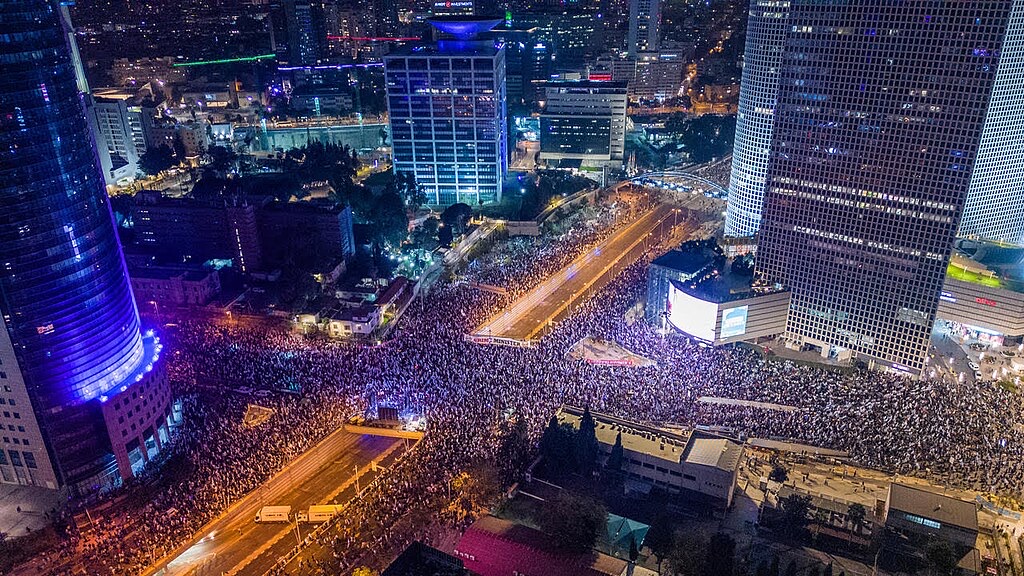On a recent trip to Israel, my Israeli cousins decided to bring me to one of the major protests that have taken place daily for more than six months. This particular one in Tel Aviv brought together 150,000 people, but not even those who were politically aligned could fit into a simple whole.
There were dozens of organizations represented – and even those willing to protest together had limited common ground. Some were focused on the rights of LGBTQ+ people, while others held strong views about Israel’s military presence in the West Bank. Some staked out positions about the rule of law, while others focused on the duration of the current prime minister’s tenure. Add to this counter-protesters, observers, media, law enforcement, and government officials – and the many people who are less politically engaged or are not intensely for or against the current government – and it’s difficult to enumerate the number of groups and subgroups, factions and counter-factions in Israel today. As one of my cousins reflected, the protest movement puts on display the extent to which the modern State of Israel might not always feel like a single cohesive nation but more akin to a confederation of tribes.
Fittingly, this week’s Torah portion, Parshat Matot-Masei (Numbers 30:2 – 36:13), focuses on the nature of tribes within ancient Israel. The tribes of old are not a perfect parallel for the tribalism to which we bear witness right now but do provide helpful insights. It is noteworthy that friction between them in times of old stemmed from questions of distributing state funds.
The context for these “resources” is a successful war that the Israelites wage against the Midianites. They despoil the Midianites in ways that might now draw consternation. By contrast, the plan for distributing the booty evinces remarkable care and compassion, even by current standards. It seems a thoughtful response to fears that the spoils of war might spoil Israelite cohesion.
We read in Numbers 31: 25 – 31 (Sefaria translation):
God said to Moses: “You and Eleazar, the priest and the family heads of the community, take an inventory of the booty that was captured, human and beast, and divide the booty equally between the combatants who engaged in the campaign and the rest of the community.
You shall exact a levy for God: in the case of the warriors who engaged in the campaign, one item in five hundred of persons, oxen, asses, and sheep, shall be taken from their half-share and given to Eleazar the priest as a contribution to God; and from the half-share of the other Israelites you shall withhold one in every fifty human beings as well as cattle, asses, and sheep—all the animals—and give them to the Levites, who attend to the duties of God’s Tabernacle.”
Something remarkable takes shape within these orders. The Israelites can only win in battle against the Midianites if they work together. But they will profit individually – after first giving their bounty to support shared religious institutions. The Tribes remain important, if not central, to the Israelites’ identities. But there is a collective purpose and sense of equality within the larger polity.
To me, as an outside observer, it seems like factionalism in contemporary Israel also stems from questions of equality. Equality in military service. Equality in economic contributions. Equality in representation. Equality in political clout. Ironically, the divided tribes seem to share but a single common thread: the sense that they are experiencing inequality.
In broad strokes, those who are against curbing the Supreme Court, on average, have benefitted the most from Israel’s high-tech boom and economic liberalization. At the same time, these same people have watched their political clout decline at what feels like a similarly precipitous rate. Add in religious and cultural undercurrents, and it’s of little surprise that every contemporary tribe can feel legitimized in its grievances – and their growing hostility to one another.
This week’s Torah portion indicates that responses to such sources of pain seldom are simple but should focus on renewing a sense of shared purpose and connections between the individual and the whole. If military service is no longer universal for all of the different segments of society, what are the unifying institutions? If religion in its many forms (including secularity) reifies division, what are the common values of Israeli society? More importantly, what could make people feel equally heard, even with their disparate needs and priorities?
Whatever one thinks of the current protest movements and whatever tribe one might feel kinship with, it is helpful to see the depth of despair at what feels like systemic unfairness.

Joshua Stanton is Rabbi of East End Temple in Manhattan and the Director of Leadership Formation at CLAL – The National Jewish Center for Learning and Leadership. He serves on the Board of Governors of the International Jewish Committee for Interreligious Consultations, which liaises on behalf of Jewish communities worldwide with the Vatican and other international religious bodies.

